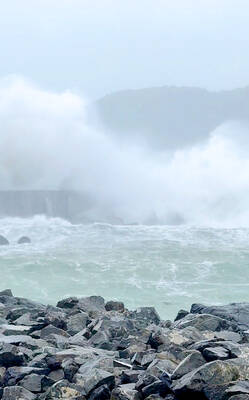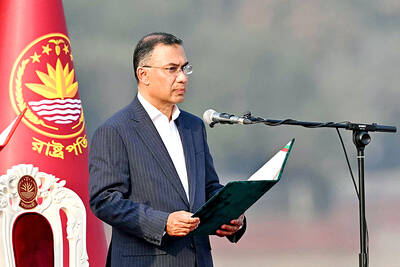The head of the International Atomic Energy Agency, Mohamed ElBaradei, gave notice yesterday of the existence of a nuclear black market of "fantastic cleverness" supplying countries illicitly seeking to develop a nuclear bomb.
Speaking after Pakistan's virtual admission that some of its top scientists were active in the illegal trade networks and the IAEA's confirmation that Libya had acquired a nuclear bomb design, he says in today's issue of Der Spiegel: "It's obvious that the international export controls have completely failed in recent years.
"A nuclear black market has emerged, driven by fantastic cleverness. Designs are drawn in one country, centrifuges are produced in another, they are then shipped via a third country and there is no clarity about the end user.
"Expert nuclear businessmen, unscrupulous firms, and perhaps also state bodies are involved. Libya and Iran made extensive use of this network."
He said at the weekend that his experts were working with Pakistan to try to crack the nuclear black market, the scale of which has stunned the IAEA and the western intelligence services investigating the Libyan and Iranian nuclear programs.
The IAEA confirmed on Friday that Libya had used the black market to buy equipment for turning uranium into weapons-grade material and had acquired designs for a nuclear warhead.
The chief suspects for helping Iran and Libya are Pakistani scientists who developed their country's bomb. The investigation is now focused on who may have supplied Colonel Muammar Qaddafi with a bomb design.
"Did Pakistan provide a nuclear weapons design to Libya?" asked David Albright, a US nuclear analyst and former UN inspector who is closely tracking the investigation. "Pakistan has offered that in the past. The IAEA has to know that."
Pakistani investigators went to Iran and Libya last week to seek help in their own inquiry. At the world economic forum in Swit-zerland in recent days President Pervez Musharraf of Pakistan admitted for the first time that nuclear scientists in Islamabad helped the Iranians in the mid-80s and early 90s.
At least eight veterans of the Pakistani bomb program are currently being held for questioning.
Much of the equipment seen in Libya after Qaddafi announced last month that he was renouncing weapons of mass destruction is of similar design to Iran's extensive uranium enrichment technology, all based on Pakistani designs derived from a 30-year-old European design.
"The Pakistani government has never, and will never proliferate," Musharraf said. "As far as Pakistan is concerned, we are carrying out a thorough investigation of any proliferation that may have been done by individuals for their personal financial gain."
His comments reflect the "rogue scientists" theory officially held by the US and the IAEA: that the Pakistanis implicated in the secret trade were acting privately and without the knowledge or blessing of the government.

Heavy rain and strong winds yesterday disrupted flights, trains and ferries, forcing the closure of roads across large parts of New Zealand’s North Island, while snapping power links to tens of thousands. Domestic media reported a few flights had resumed operating by afternoon from the airport in Wellington, the capital, although cancelations were still widespread after airport authorities said most morning flights were disrupted. Air New Zealand said it hoped to resume services when conditions ease later yesterday, after it paused operations at Wellington, Napier and Palmerston North airports. Online images showed flooded semi-rural neighborhoods, inundated homes, trees fallen on vehicles and collapsed

‘COST OF DEFECTION’: Duterte’s announcement could be an effort to keep allies in line with the promise of a return to power amid political uncertainty, an analyst said Philippine Vice President Sara Duterte yesterday announced she would run for president of the Southeast Asian nation of 116 million in 2028. Duterte, who is embroiled in a bitter feud with Philippine President Ferdinand Marcos Jr, was impeached last year only to see the country’s Supreme Court throw the case out over procedural issues. Her announcement comes just days before her father, former Philippine president Rodrigo Duterte, begins a pretrial hearing at the International Criminal Court (ICC) in the Netherlands over crimes against humanity allegedly committed as part of a brutal crackdown on drugs. “I offer my life, my strength and my future

NOT YET THERE: While the show was impressive, it failed to demonstrate their ability to move in unstructured environments, such as a factory floor, an expert said Dancing humanoid robots on Monday took center stage during the annual China Media Group’s Spring Festival Gala, China’s most-watched official television broadcast. They lunged and backflipped (landing on their knees), they spun around and jumped. Not one fell over. The display was impressive, but if robots can now dance and perform martial arts, what else can they do? Experts have mixed opinions, with some saying the robots had limitations and that the display should be viewed through a lens of state propaganda. Developed by several Chinese robotics firms, the robots performed a range of intricate stunts, including martial arts, comedy sketches and choreographed

POST-UPRISING: Bangladesh Nationalist Party lawmakers were yesterday expected to formally elect Tarique Rahman as their leader and new head of government Bangladesh’s prime minister-to-be Tarique Rahman and lawmakers were yesterday sworn into parliament, becoming the first elected representatives since a deadly 2024 uprising. Rahman is set to take over from an interim government that has steered the country of 170 million people for 18 months since the autocratic government of Sheikh Hasina was overthrown. The lawmakers, who promised loyalty to Bangladesh, were sworn in by Chief Election Commissioner AMM Nasir Uddin. Bangladesh Nationalist Party (BNP) lawmakers are expected to formally elect Rahman as their leader, with President Mohammed Shahabuddin then to administer the oath of office to the prime minister and his ministers